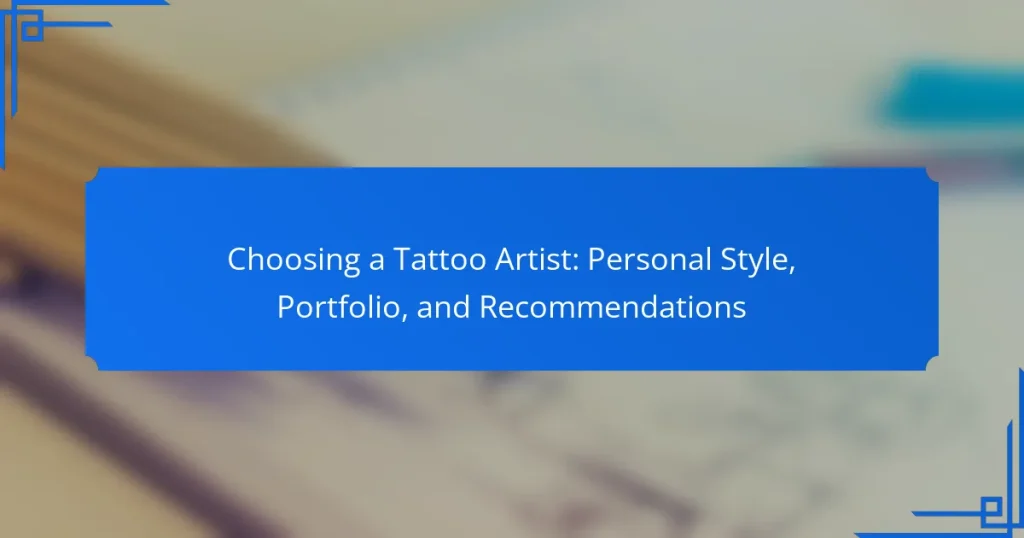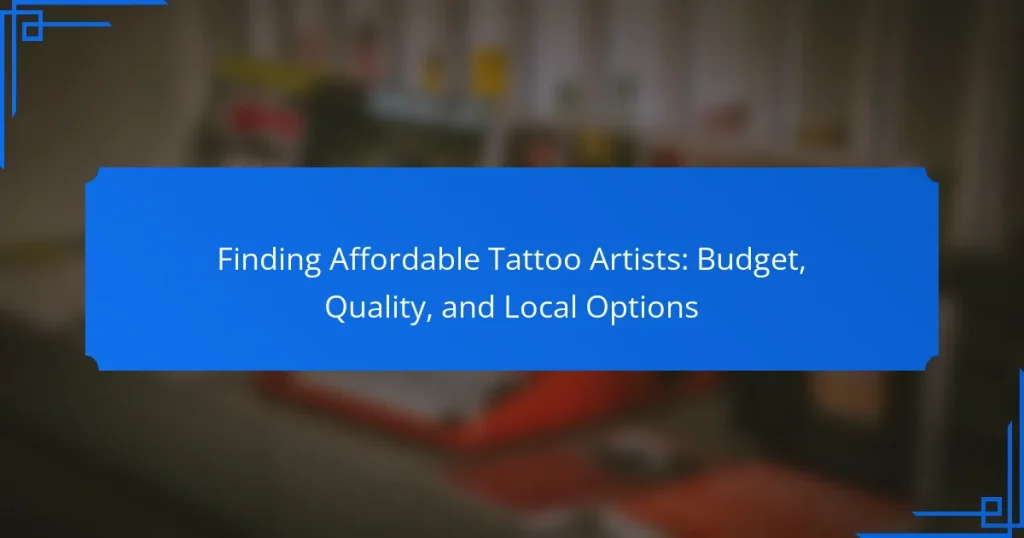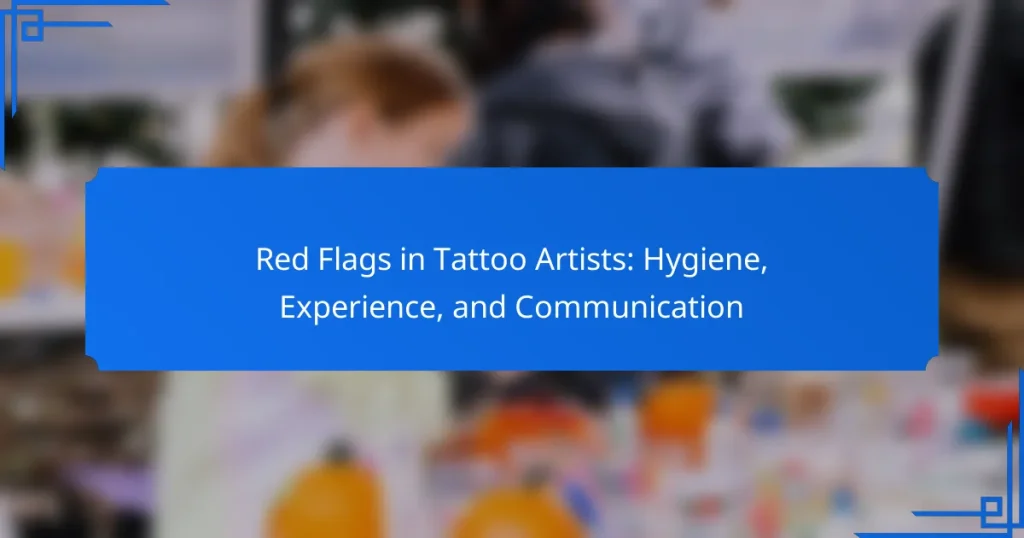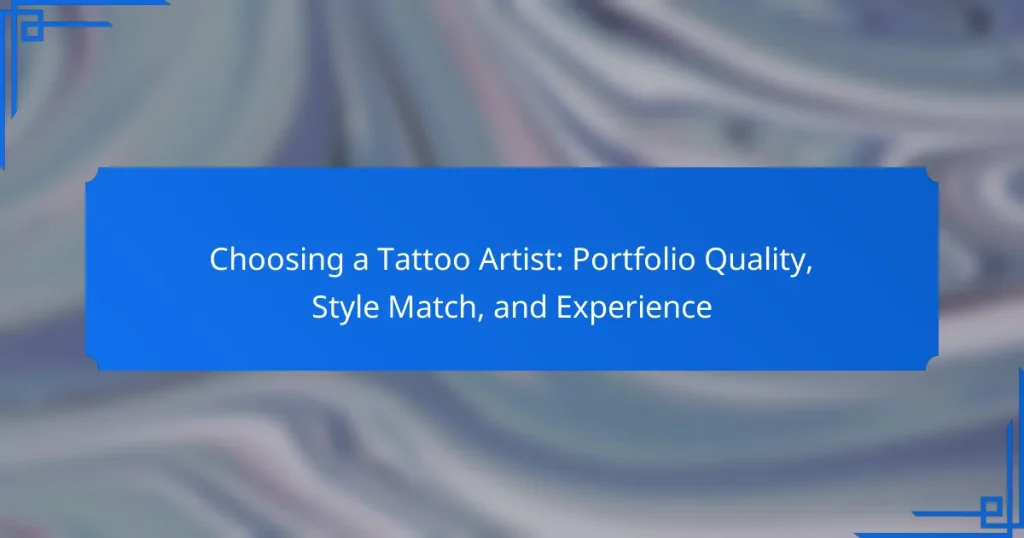Finding the right tattoo artist is essential for bringing your vision to life while ensuring a safe and enjoyable experience. By evaluating their portfolio, client feedback, and hygiene practices, you can make an informed choice that aligns with your style and preferences. A thorough consultation will also help clarify design details, pricing, and aftercare, setting the stage for a successful tattoo journey.
Choosing a Tattoo Artist: Personal Style, Portfolio, and Recommendations
Finding a Tattoo Artist: Specialization, Reviews, and Designs
Finding Affordable Tattoo Artists: Budget, Quality, and Local Options
Questions to Ask: Tattoo Artist Selection, Experience, and Style
Red Flags in Tattoo Artists: Hygiene, Experience, and Communication
Choosing a Tattoo Artist: Portfolio Quality, Style Match, and Experience
How to Choose the Right Tattoo Artist?
Choosing the right tattoo artist involves assessing their skills, style, and professionalism to ensure your vision is realized safely and beautifully. Focus on their portfolio, client feedback, hygiene practices, specialties, and communication to make an informed decision.
Check artist portfolios
Reviewing an artist’s portfolio is essential to understanding their style and skill level. Look for a variety of completed works that showcase their range, including different designs and techniques. Pay attention to the quality of line work, shading, and color application.
Consider whether the artist’s previous tattoos align with your desired design. If you want a specific style, such as realism or traditional, ensure the artist has experience in that area. A strong portfolio is a good indicator of an artist’s capability.
Read client reviews
Client reviews provide insights into an artist’s professionalism and customer satisfaction. Look for feedback on platforms like social media, tattoo forums, or review sites. Positive reviews often highlight the artist’s skills, cleanliness, and overall experience.
Be cautious of any recurring negative comments, especially regarding hygiene or customer service. A well-reviewed artist is more likely to deliver a satisfactory experience and outcome.
Evaluate hygiene practices
Hygiene is critical in tattooing to prevent infections and ensure safety. Check if the artist follows proper sterilization protocols, such as using single-use needles and disposable gloves. A clean workspace is also a good sign of professionalism.
Don’t hesitate to ask the artist about their hygiene practices. They should be able to explain their procedures clearly and confidently. Ensuring a safe environment is paramount for a positive tattoo experience.
Consider artist specialties
Different tattoo artists may specialize in various styles, such as black and gray, watercolor, or tribal designs. Identifying an artist’s specialty can help you find someone who is particularly skilled in the style you want. This can significantly impact the final result.
Research artists who have a strong reputation in your desired style. If you’re looking for intricate details, an artist known for fine line work may be ideal. Specialization often correlates with a higher quality of work.
Assess communication style
Effective communication with your tattoo artist is crucial for a successful collaboration. Pay attention to how they respond to your questions and ideas. A good artist should be open to discussing your vision and providing feedback or suggestions.
Consider scheduling a consultation to gauge their communication style. This meeting can help you determine if you feel comfortable expressing your ideas and if the artist understands your expectations. Clear communication can lead to a more satisfying tattoo experience.
What Are the Top Tattoo Studios in [Your City]?
The top tattoo studios in [Your City] are known for their skilled artists, diverse styles, and positive customer reviews. When choosing a studio, consider the specialties of each artist, the cleanliness of the environment, and the overall reputation of the studio.
Studio A: Specialties and reviews
Studio A is renowned for its intricate designs and custom artwork, specializing in both traditional and contemporary styles. Clients frequently praise the attention to detail and the professionalism of the artists.
Reviews highlight the welcoming atmosphere and the thorough consultation process, ensuring that each tattoo reflects the client’s vision. Many customers report satisfaction with the healing process and the quality of the ink used.
Studio B: Specialties and reviews
Studio B focuses on minimalist tattoos and fine line work, attracting clients who prefer subtle and elegant designs. The artists here are known for their precision and ability to create delicate patterns.
Feedback from clients often mentions the studio’s cleanliness and the friendly demeanor of the staff. Many appreciate the aftercare advice provided, which helps in achieving optimal healing results.
Studio C: Specialties and reviews
Studio C is famous for its bold colors and large-scale pieces, catering to those looking for statement tattoos. The artists are experienced in various styles, including neo-traditional and watercolor tattoos.
Customer reviews frequently commend the studio’s vibrant atmosphere and the collaborative approach taken during the design phase. Clients often leave feeling confident in their choices and satisfied with the final results.
What Should You Expect During a Tattoo Consultation?
During a tattoo consultation, you can expect to discuss your design preferences, understand pricing and timelines, and review aftercare instructions. This meeting is crucial for setting clear expectations and ensuring a smooth tattooing process.
Discuss design ideas
In this part of the consultation, you’ll share your vision for the tattoo. Bring reference images or sketches to help communicate your ideas effectively. The artist will provide feedback on your concepts, suggesting adjustments based on their expertise and style.
Consider discussing size, placement, and color schemes. This dialogue helps ensure that the final design aligns with your expectations and the artist’s capabilities.
Understand pricing and timelines
Pricing for tattoos can vary widely based on factors like size, complexity, and the artist’s experience. Expect to discuss an estimated range, which could be anywhere from low hundreds to several thousand dollars. Make sure to clarify whether the quote includes all sessions and any additional costs.
Timelines are also important; larger or more intricate tattoos may require multiple sessions. Ask about the expected duration of each session and the overall timeline for completion to plan accordingly.
Review aftercare instructions
Aftercare is essential for ensuring your tattoo heals properly and retains its quality. Your artist will provide specific instructions, which typically include keeping the area clean, applying ointment, and avoiding sun exposure.
Follow these guidelines closely to prevent infections and fading. It’s also wise to ask questions about any concerns you may have regarding the healing process or potential reactions to the ink.
How Much Does a Tattoo Cost in Your City?
The cost of a tattoo in your city can vary significantly based on several factors, including the artist’s experience, the complexity of the design, and the location of the studio. Generally, you can expect to pay anywhere from a few hundred to several thousand dollars for a tattoo, depending on these variables.
Average price per hour
The average price per hour for a tattoo artist typically ranges from $100 to $300. Established artists in high-demand areas may charge more, while newer artists or those in less populated regions might charge on the lower end of this spectrum. It’s essential to consider the artist’s portfolio and reputation when evaluating their hourly rate.
Factors affecting tattoo pricing
<pSeveral factors can influence tattoo pricing, including the artist's skill level, the intricacy of the design, and the time required to complete the tattoo. Custom designs or larger pieces usually cost more due to the additional planning and execution involved. Additionally, the location of the tattoo studio can impact pricing, with urban areas often having higher rates than rural ones.
Common pricing ranges for different styles
Different tattoo styles can have varying pricing structures. For example, simple line work may cost between $50 and $150, while more detailed and colorful pieces can range from $200 to $500 or more. Specialty styles, such as realism or intricate geometric designs, often start at $300 and can go much higher based on size and detail.
What Are the Common Risks of Getting a Tattoo?
Getting a tattoo carries several risks that potential clients should consider before proceeding. Common risks include infection, allergic reactions, and the potential for regret, which may lead to removal options later on.
Infection risks
Infection is one of the most significant risks associated with tattoos. Bacteria can enter the skin during the tattooing process, leading to localized infections or, in severe cases, systemic infections. To minimize this risk, ensure that the artist uses sterile equipment and follows proper hygiene protocols.
Signs of infection may include redness, swelling, and pus at the tattoo site. If you notice these symptoms, seek medical attention promptly to prevent complications.
Allergic reactions
Allergic reactions to tattoo ink can occur, although they are relatively rare. Some individuals may experience itching, rashes, or swelling due to specific pigments or additives in the ink. It’s advisable to ask the tattoo artist about the ink’s ingredients and consider doing a patch test on a small area of skin before committing to a larger design.
If you have a history of skin allergies, consult with a dermatologist before getting a tattoo to discuss potential risks and suitable inks.
Regret and removal options
Regret is a common concern for many people after getting a tattoo, whether due to changes in personal taste or life circumstances. If you find yourself regretting a tattoo, several removal options are available, including laser removal, surgical excision, and dermabrasion. Laser removal is the most popular method, as it can effectively break down ink particles over multiple sessions.
Consider the cost and time involved in removal, as it can be a lengthy and expensive process, often requiring several treatments. Weighing the permanence of a tattoo against potential future regret is crucial before making a decision.






